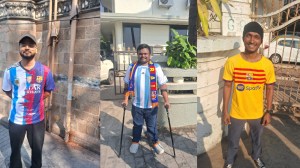Click here to join Express Pune WhatsApp channel and get a curated list of our stories
WHO adds diabetes drugs to essential list: win for patient advocacy, says Pune NGO founder who pushed for insulin access at expert panel meet
Nupur Lalvani says the inclusion of rapid-acting insulin analogues and GLP-1 receptor agonists in the WHO list of essential medicines will reduce out-of-pocket costs for diabetes care.
 At the Blue Circle Diabetes Foundation in Camp, Pune, Lalvani leads the country's most extensive patient-led advocacy and support group for people living with all types of diabetes. (Express Photo)
At the Blue Circle Diabetes Foundation in Camp, Pune, Lalvani leads the country's most extensive patient-led advocacy and support group for people living with all types of diabetes. (Express Photo)As the World Health Organization (WHO) added a new set of drugs for diabetes to its list of essential medicines on September 5, it was vindication for Pune-based Nupur Lalvani, who was the sole representative from India to have the opportunity to speak to a WHO expert committee earlier this year.
Lalvani, 38, who has been living with Type 1 diabetes since the age of 8, said, “This is a historic decision and is proof that patient advocacy matters as the WHO’s decision formally recognises that diabetes care is a necessity and not a luxury.”
Founder of the Pune-based Blue Circle Diabetes Foundation, Lalvani addressed the WHO Open Session of the 25th Expert Committee on the Selection and Use of Essential Medicines in Geneva on May 5.
In a formal statement on behalf of several Indian diabetes organisations, she highlighted the urgent need for access to rapid-acting insulin analogues and Glucagon-like peptide-1 (GLP-1) receptor agonists, a class of medications used to treat Type 1 and Type 2 diabetes and obesity. She made the case from both personal lived experience and the collective voice of the community.
Human insulin has been on the WHO Essential Medicines List (EML) since 1977, and long-acting insulin (glargine) was added in 2021. For the first time, the EML now includes rapid-acting insulin analogues and GLP-1 receptor agonists.
According to Lalvani, this landmark decision follows years of advocacy from diabetes organisations and patient advocates worldwide, including groups in India. She said that for far too long, millions of people with various types of diabetes in India and other low- and middle-income countries have struggled to afford the insulin and medications necessary for their survival.
 Lalvani addressed the WHO Open Session of the 25th Expert Committee on the Selection and Use of Essential Medicines in Geneva on May 5. (Express Photo)
Lalvani addressed the WHO Open Session of the 25th Expert Committee on the Selection and Use of Essential Medicines in Geneva on May 5. (Express Photo)
“When the WHO added new diabetes medicines to the EML following advocacy by patient organisations, out-of-pocket costs will now be lower,” she said.
She added that they will now urge the Ministry of Health and Family Welfare to move quickly to add these medicines to the national list of essential medicines, so that people can feel the relief in their daily lives without delay.
“This update also moves us closer to universal health coverage, ensuring that essential diabetes care is not a privilege but a right,” she said.
The inclusion of rapid-acting analogues formally recognises the basal–bolus regimen, the global standard of care for Type 1 diabetes, which mimics the body’s natural insulin production by using a long-acting (basal) insulin to cover background needs and a rapid-acting (bolus) insulin before each meal to control blood sugar spikes from food.
Diabetes patients and their families have welcomed the addition of new drugs to the WHO EML.
Akanksha Sabharwal Shekatkar from Pune, whose 8-year-old son has Type 1 diabetes, said, “Insulin is a life-saving drug that should be accessible and affordable to everyone, as every human has the right to live and to afford essential medication. While there is still a long way to go, this marks an important first step in the right direction.”
Pushing for systemic change
At the Blue Circle Diabetes Foundation in Camp, Pune, Lalvani leads the country’s most extensive patient-led advocacy and support group for people living with all types of diabetes.
In just a few weeks, world leaders will gather in New York for the United Nations General Assembly High-Level Meeting on noncommunicable diseases (NCDs), where access to essential medicines will again be in focus. Patient advocates, including Lalvani, will be present to represent the voice of people living with diabetes on the global stage.
“We work to make life with all types of diabetes simpler through awareness, peer support, advocacy, and access initiatives, building community and pushing for systemic change at local, national and global levels,” she said.
Click here to join Express Pune WhatsApp channel and get a curated list of our stories








